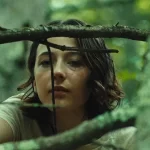Sundance 2020: Dick Johnson Is Dead, by David Bax

We always hope for the best possible outcome for our loved ones but we also all know what that final outcome is going to be. Every person you’ve ever loved, no matter how much you love them, is going to die. How do we hang on to hope, then? And how do we even begin to comprehend our own deaths?
C. Richard Johnson is the father of director Kirsten Johnson (Cameraperson). He’s a widower in his mid-80s who, at least at the time we meet him, still lives alone and has a psychiatric practice in Seattle. His memory and health are failing, though, and Kirsten will need to move him permanently to her home in New York. With all this time together on their hands, Kirsten decides to stage various possible death scenes—with Dick playing himself—as well as some afterlife fantasies. All of these she mixes with documentary footage about her father’s life and his present day-to-day reality.
With Dick increasingly forgetful about where he is and what he’s doing, we start to question the ethics of how Kirsten is using him in her movie. So does she. But he’s always so receptive to having the situation explained that we begin to realize that coddling him would be part of a self-deluding instinct toward infantilizing the aged, trying to force a regression on them to ignore the fact that they’re getting closer to the end, not the beginning.
Each of the fatal scenarios Kirsten stages for Dick are sudden and accidental, involving things like falling or getting hit on the head. They’re funny; she goes out of her way to make them funny. But when we are reminded that Kirsten’s mother, who had Alzheimer’s, had what Dick calls a “long goodbye,” it suggests that Kirsten might almost prefer one of these low-rent Final Destination incidents. Having been through it before, perhaps she’s worried less about her father’s death than she is about his dying. Or maybe it’s just a way for her to practice losing him over and over again in an attempt to exorcise the dread.
It helps that Dick has such a good sense of humor; born without functioning toes, he claims that his mother burst into tears when she first saw his feet. “How do you know?” Kirsten asks, to which he exclaims, “I was there!” This positive attitude extends even toward his own demise. That’s not to suggest that he’s not afraid at times. One sequence, a staged silent horror throwback, makes an attempt to put us inside his mind when it’s at its most confused. It’s painful to contemplate that kind of fear. But maybe we experience Dick’s death over and over again not to come to peace with it—something he’s already done—but to come to peace with the fact that it’s going to happen to us too.





























